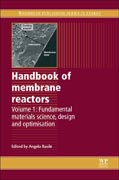
Handbook of Membrane Reactors: Fundamental Materials Science, Design And Optimisation
Basile, Angelo
Membrane reactors are increasingly replacing conventional separation, process and conversion technologies across a wide range of applications. Exploiting advanced membrane materials, they offer enhanced efficiency, are very adaptable and have great economic potential. There has therefore been increasing interest in membrane reactors from both the scientific and industrial communities, stimulating research and development. The two volumes of the Handbook of membrane reactors draw on this research to provide an authoritative review of this important field.Volume 1 explores fundamental materials science, design and optimisation, beginning with a review of polymeric, dense metallic and composite membranes for membrane reactors in part one. Polymeric and nanocomposite membranes for membrane reactors, inorganic membrane reactors for hydrogen production, palladium-based composite membranes and alternatives to palladium-based membranes for hydrogen separation in membrane reactors are all discussed. Part two goes on to investigate zeolite, ceramic and carbon membranes and catalysts for membrane reactors in more depth. Finally, part three explores membrane reactor modelling, simulation and optimisation, including the use of mathematical modelling, computational fluid dynamics, artificial neural networks and non-equilibrium thermodynamics to analyse varied aspects of membrane reactor design and production enhancement.With its distinguished editor and international team of expert contributors, the two volumes of the Handbook of membrane reactors provide an authoritative guide for membrane reactor researchers and materials scientists, chemical and biochemical manufacturers, industrial separations and process engineers, and academics in this field. Considers polymeric, dense metallic and composite membranes for membrane reactorsDiscusses cereamic and carbon for membrane reactors in detailReactor modelling, simulation and optimisation is also discussed INDICE: Part 1 Polymeric, dense metallic and composite membranes for membrane reactors: Polymeric membranes for membrane reactors; Inorganic membrane reactors for hydrogen production: An overview with particular emphasis on dense metallic membrane materials; Palladium-based composite membranes for hydrogen separation in membrane reactors; Alternatives to palladium in membranes for hydrogen separation: Nickel, niobium and vanadium alloys, ceramic supports for metal alloys and porous glass membranes; Nanocomposite membranes for membrane reactors. Part 2 Zeolite, ceramic and carbon membranes and catalysts for membrane reactors: Zeolite membrane reactors; Dense ceramic membranes for membrane reactors; Porous ceramic membranes for membrane reactors; Microporous silica membranes: Fundamentals and applications in membrane reactors for hydrogen separation; Carbon-based membranes for membrane reactors; Advances in catalysts for membrane reactors. Part 3 Membrane reactor modelling, simulation and optimisation: Mathematical modelling of membrane reactors: Overview of strategies and applications for the modelling of a hydrogen-selective membrane reactor; Computational fluid dynamics (CFD) analysis of membrane reactors: Simulation of single- and multi-tube palladium membrane reactors for hydrogen recovery from cyclohexane; Computational fluid dynamics (CFD) analysis of membrane reactors: Simulation of a palladium-based membrane reactor in fuel cell micro-cogenerator system; Computational fluid dynamics (CFD) analysis of membrane reactors: Modelling of membrane bioreactors for municipal wastewater treatment; Models of membrane reactors based on artificial neural networks and hybrid approaches; Assessment of the key properties of materials used in membrane reactors by quantum computational approaches; Non-equilibrium thermodynamics for the description of transport of heat and mass across a zeolite membrane.
- ISBN: 978-0-85709-414-8
- Editorial: Woodhead Publishing
- Encuadernacion: Cartoné
- Páginas: 696
- Fecha Publicación: 08/02/2013
- Nº Volúmenes: 1
- Idioma: Inglés
